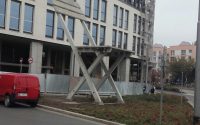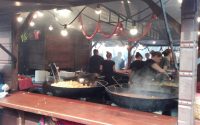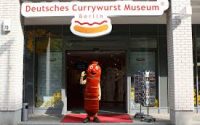Bonn – The Accidental Capital City
07.10.2017
Last night as I filled out my Interrail card I realised that I had badly miscalculated. Today is the final day I can use this as today is my seventh of the seven days in a month’s allowance and I still have another three journeys to make in a day. What to do? Interrail customer services are not really much help merely suggesting that I buy tickets for the journeys I’m missing out on which are Bonn-Köln, Köln-Brussels and Brussels-London. I look at the Eurorail website and that all comes to €400. It struck me that by buying another Pass at a main station, I might be able to save my reservations. Bingo! Augsburg just happens to be that station and the cost €200. Ironic I have to spend that to save the same amount, but that’s life. The journey from Augsburg to Mannheim is total comfort – footstool and legroom – made in Heaven.
I have a premonition about the train from Mannheim to Bonn when I study the arrival and departure board and the delays increasing from 5 minutes to 10, 15 and then 20. It also announced that every coach would be second class. I was less wondering about that than just what was coming down the line. Sure enough, as it arrived at the platform the coaches looked that they had been fetched from a long forgotten siding overgrown with weeds and grass. The signs on the carriages say ‘Ersatzzug’ which means ‘replacement’ or ‘substitute’ train. No first class, packed full, no seats and a journey of 2 hours 15 minutes ahead so I had to resign myself and lean against a handrail across the corridor window. Oh and the toilets were out of order. The nearest meant weaving your way in and out of the lines of other standing passengers. And they speak of German efficiency! Well, at least the Germans themselves don’t believe that, it’s another figment of the Anglo-Saxon imagination. At Mainz, half an hour from Mannheim, the train stopped and sufficient people disembarked to free up seats. The one I found was beside three old biddies, cumulative ages I’d say nearly 250, electric zimmers partially blocking the passageway, (to be fair I think they had made a an attempt not to cause too much of an obstruction) consuming brown bread sandwiches and biscuits by the bucket load. To compensate for these downsides, for about 60 km the train ran alongside the River Rhein and it’s breathtaking scenery. Castles and houses atop hills (a glacial valley at this point) with vineyards on south facing escarpments. A treat. There are markers every kilometre to indicate the length of the river. By the time the river was out of sight the marker said 550 km from its source in Switzerland.
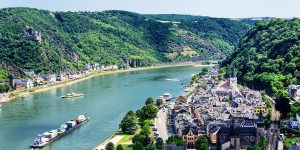
Finally arriving in Bonn, the taxi driver is Kurdish origin and now a German citizen and of course speaks good English. I think that in today’s Germany for younger people and the migrant population which is now German, WW2 is an irrelevance, or at least they don’t dwell on it. They are well aware of the disaster it was for the world, have learned the hard lessons and have moved on whilst still respectful of the damage that was done by the Nazis. As one German rather gleefully put it to me ‘Hitler’s eternal Hell will be watching how Germany has evolved into everything he hated and there is no going back.’ Its citizens who were born and raised in what was West Germany are quietly proud to call themselves German regardless of race or religion and are happy with the country’s achievements. I cannot say whether this is the same for East Germans as their experience was entirely different and I think it will take at least two more generations before there is any clear sign of assimilation. Such a contrast from the UK where we cannot move on from WW2 with its constant reminders from right wing press and hard right politicians. Has it got something to do with jealousy? One word of caution for Germany. It could become smug and complacent especially if it forgets the resentment of its eastern citizens. It has to address their concerns.
What a contrast this to Poland, which I believe should welcome migrants albeit gradually and not suddenly. Its post war homogeneity has allowed politicians such as those in the current government to skew reality and democracy. It could learn from some of the mistakes that we in the West made in our failure to encourage integration of our new citizens from beyond Europe. Fortunately the ones that matter, the younger people, will ensure those old attitudes diminish. Poland, historically always was a diverse country, as my own background testifies. It will revert to that again once it gets the current government out of its system.
08.10.2017
My initial impression of Bonn ( https://en.wikipedia.org/wiki/Bonn) is underwhelming but to be fair this is in context with all the other places I have been for the last 5 weeks. I might have had a better impression had I begun here, but I had no reason to. The city really became the accidental capital of West Germany, or the Federal Republic of Germany, to give it its proper title, because Berlin had been divided between the four occupying powers and more logistically West Berlin was surrounded by the German Democratic Republic but really because the Russians would never have permitted it. Why choose Bonn? It was in the British sector of Germany after WW2 and of little major significance compared to Hamburg or any of the other major cities of West Germany. The first Federal Chancellor of West Germany, Konrad Adenauer (whose sculpture features on the title page of this blog) chose it mainly for that reason as he imagined that Germany would be reunified soon after WW2 and the capital city would move back to Berlin. Bonn, by implication was an inoffensive temporary choice. Today, however, many major federal government institutions remain there and Bonn is officially designated a Federal City to reflect its importance politically. Apart from being Beethoven’s birthplace, well, that’s about it. It’s not bad but hardly qualifies for a ‘must-see’ list.
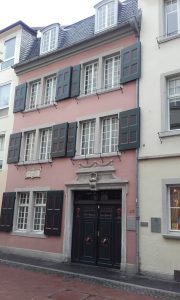
However, the walk on the promenade beside the Rhein is worth it and you can stop at any one of the cafes and admire, in total relaxation, the activity on the river. Some of the river cruisers are the length of ferries, certainly larger than the ones that cross the Irish Sea. Commercial traffic also makes extensive use of this waterway. Barges with the flags of Netherlands, Belgium and of course Germany pass by regularly. This part of Europe is well integrated for trade. Yes, there are old interesting buildings here ,but nothing that’s any better than the other cities I have visited.
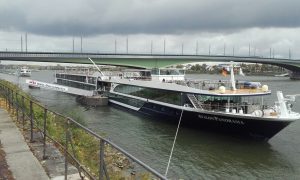
Passing by a UBahn station with the easy to remember name – Bundesrechnungshof/At wärtiges Amt, I notice four quotations on the perspex glass entrance enclosure:
‘Das Selbstbestimmungsrecht das wir forden, verträgt keine Einschränkungen’
The right to self-determination that we demand, does not tolerate restrictions’
‘Die Freiheit die wir erwarten verträgt keine Begrenzung. Beide besitzt man ganz oder gar nicht’
‘The freedom we expect can not tolerate any limitation. Both are either complete or not at all ‘
‘Wir Deutschen sollten die Wahrheit auch dann ertragen, lernen wenn sie für uns günstig ist’
‘We Germans should bear the truth even if it is not favourable for us’
‘Umkraut jäten al ein macht noch keinen Garten und Verhindern ist keine Politik’
‘Weed alone does not make a garden and prevent is not a policy’ Hmm……I wonder what that’s supposed to mean?
09.10.2017
I have visited Köln (Cologne) once before while still at school and have a vague recollection of its Roman Catholic Gothic Cathedral, dedicated to St. Peter. What I hadn’t appreciated at the time was its sheer size and scale, easily dominating everything within range – a mighty monument indeed, dating back to 1248. Köln had been my first choice of base for these few days but accommodation had mostly been taken up and the cost of hotel accommodation was prohibitive.
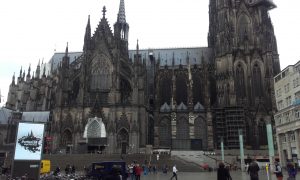
Köln is a fine old city dating back to Roman times and an exhibition of Roman ruins confirms this. It’s location along the Rhein made it like all other major cities along the river’s length important trading and centres of learning – exchanges of goods and ideas. Is it any wonder that so many Hanseatic cities grew up along its length. I had thought if the weather had been a bit more considerate, it would have been a bonus to have arrived from Bonn on a Rhein cruiser. Perhaps that is for another day. It is a pity that the weather has turned so bad and I’m restricted to a few museums which while of great interest and well laid out, you can only take so many. So what do I deduce from this one day visit? It’s the geography of Europe more than anything. Rivers know no borders and just because some king or emperor draws a line on a map doesn’t mean that the citizens on both sides of this artificially created divide should be prevented from sharing ideas and developing means of mutual understanding linguistically and culturally. Thankfully the continent just about held together in the face of historical hostile nationalistic tendencies. Lets us hope it continues.
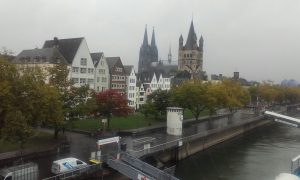
This is likely to be my last day of doing anything worthwhile in Germany until the next visit.
10.10.2017
It’s usually the same the last day of time away, not sure what to do, hanging around, too early yet to pack. I can’t call the last five weeks a holiday because I was searching for family roots and learning more about both countries, learning the languages and not being among English speakers all the time. I have a better handle on all of that but there is room for vast improvement and I have to commit some time each day to improving Polish and German. I see that I cannot fall back on the old excuse of having no one to speak it with. Yes, Poles and Germans can fall back on English with other Europeans who don’t speak their languages, but it’s not like they are using English every day. It is also different because I’m not returning to work right away; it is six weeks yet until then.
I walk in the direction of Schloss Poppelsdorf, (Poppelsdorf Palace) mainly because I’ve not walked down that section before, the Südstadt. The building itself, a Baroque style palace was commissioned by the Archbishop of Köln in 1715 and is built on the site of the previous Schloss Poppelsdorf. The buildings in the surrounding area are also grand and now seem entirely given over to offices. Anyone with an office here is, I would say, sited in a prestige area. It’s current owner is the University of Bonn.
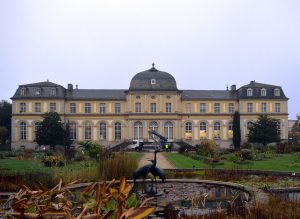
I promised myself a walk down the Rhein promenade again and there is a difference taking your time and focussing on anything you fancy, sipping a coffee in one of the cafes and just being in the moment.
A fragment of the old city wall has been preserved, which suggests this city was strategically placed in the course of history. I don’t know the extent renovations that have been carried out over the years but the portcullis is still there and the wall seems quite sound so it must have been a well fortified settlement.
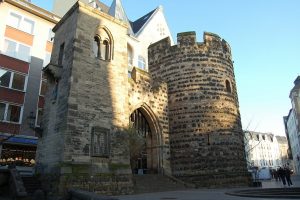
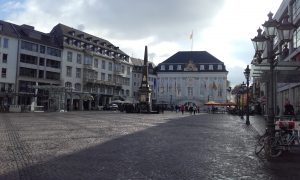
This is the last full day in Germany and once again I’ve been made to feel welcome. It certainly helps when you make the attempt to speak the language and I’ve added many more words and phrases to my burgeoning vocabulary. Now that would be a goal – to become completely fluent in Polish and German, the former the greater challenge.
11.10.2017
The journey back begins with a tramcar ride to Bonn Hauptbanhof. I can’t answer whether I feel I have been away for a long time or not. I measured it not in days and weeks but in places I’ve been and seen, things I have discovered and experiences I’ve had. I felt welcomed in both countries and drama aside, it felt like being home. They have problems but I get the feeling common sense will always win. The Poles have a saying ‘Jakoś to będzie’ which roughly translates as ‘somehow it will be’ but whatever, the sentiment is to keep going. It suggests having a positive outlook no matter what.
There are no hitches on the way, no cancellations except that I nearly get off the train at the wrong Brussels station – Nord rather than Midi. My case is off the rack and I have already made my way to the door when I see not everyone is getting off. Whatever it is, it stops me saves me an unnecessary bus trip to the correct station; so thank you.
At Brussels Midi station we have to get through the UK border, which begins in Belgium – seriously though – we’re in Belgium, but the sign says ‘Welcome to Great Britain and Northern Ireland.’
I have already had a foretaste of what lies ahead in the UK with the latest Brexit news. Many Brexiteers go on as if we are something special, as if we will be missed if we leave the EU, as if they will bend over backwards to do a trade deal with the UK. The threats of ‘no deal’ just don’t wash. Our traditional allies, the Poles just shrug their shoulders and walk off bored with the whole charade. The truth is that no one here really cares. I used to care about Britain, not in a patriotic way but because it felt a welcoming place for incomers. Never was there any suggestion that Indians or others from the Commonwealth countries arrived as scroungers or out to milk the system. But then enter the cheap joke pub comedian. Stereotypes are always good for racist or xenophobic jibes. Then enter sections of our media to enhance that into fact. The best we can hope for is that this is a passing phase and the Brexit madness will dissipate and common sense set in which in effect means prioritising the young people’s manifesto for a decent life. Enough of this digression but I have to get that out of my system before boarding the Eurostar.
The Eurostar reaches speeds of 300kph but you hardly feel it, the ride is so smooth and the time in the Channel Tunnel is about 20 minutes. At 1600 as the train arrives at St. Pancras Station, this part of my search ends.
Ends.
There will be no post next week but look out for a Christmas Greeting next Wednesday
